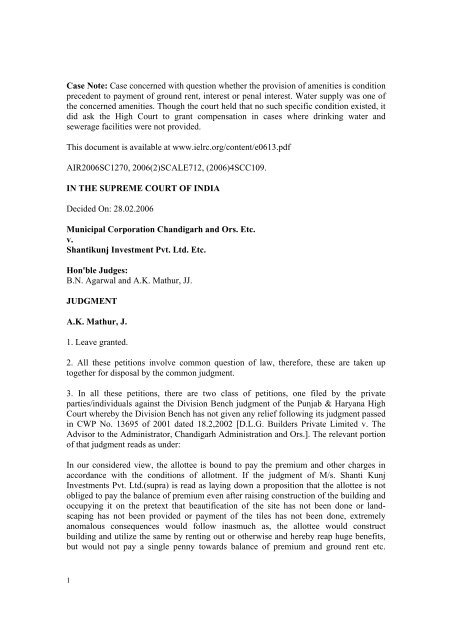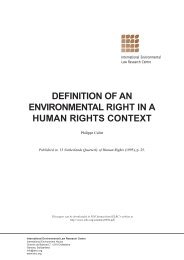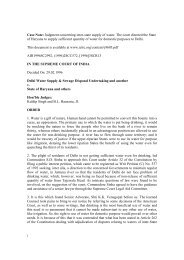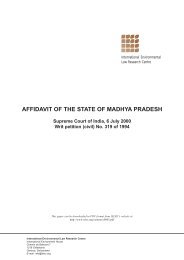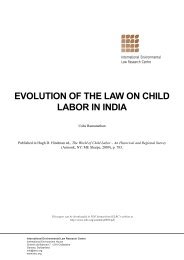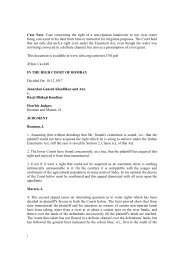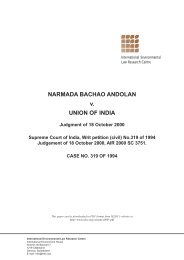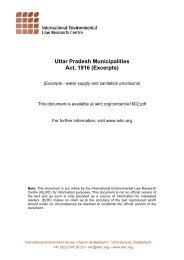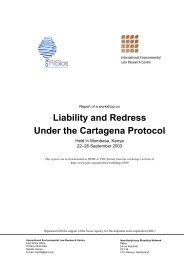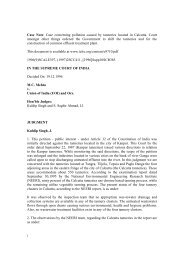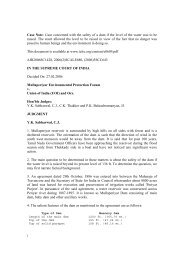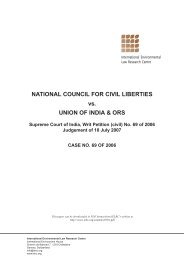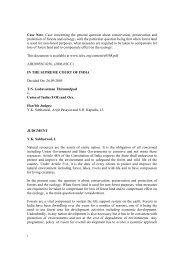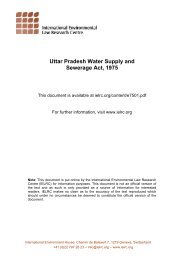Municipal Corporation Chandigarh v. Shantikunj Investment Pvt. Ltd ...
Municipal Corporation Chandigarh v. Shantikunj Investment Pvt. Ltd ...
Municipal Corporation Chandigarh v. Shantikunj Investment Pvt. Ltd ...
Create successful ePaper yourself
Turn your PDF publications into a flip-book with our unique Google optimized e-Paper software.
Case Note: Case concerned with question whether the provision of amenities is conditionprecedent to payment of ground rent, interest or penal interest. Water supply was one ofthe concerned amenities. Though the court held that no such specific condition existed, itdid ask the High Court to grant compensation in cases where drinking water andsewerage facilities were not provided.This document is available at www.ielrc.org/content/e0613.pdfAIR2006SC1270, 2006(2)SCALE712, (2006)4SCC109.IN THE SUPREME COURT OF INDIADecided On: 28.02.2006<strong>Municipal</strong> <strong>Corporation</strong> <strong>Chandigarh</strong> and Ors. Etc.v.<strong>Shantikunj</strong> <strong>Investment</strong> <strong>Pvt</strong>. <strong>Ltd</strong>. Etc.Hon'ble Judges:B.N. Agarwal and A.K. Mathur, JJ.JUDGMENTA.K. Mathur, J.1. Leave granted.2. All these petitions involve common question of law, therefore, these are taken uptogether for disposal by the common judgment.3. In all these petitions, there are two class of petitions, one filed by the privateparties/individuals against the Division Bench judgment of the Punjab & Haryana HighCourt whereby the Division Bench has not given any relief following its judgment passedin CWP No. 13695 of 2001 dated 18.2,2002 [D.L.G. Builders Private Limited v. TheAdvisor to the Administrator, <strong>Chandigarh</strong> Administration and Ors.]. The relevant portionof that judgment reads as under:In our considered view, the allottee is bound to pay the premium and other charges inaccordance with the conditions of allotment. If the judgment of M/s. Shanti Kunj<strong>Investment</strong>s <strong>Pvt</strong>. <strong>Ltd</strong>.(supra) is read as laying down a proposition that the allottee is notobliged to pay the balance of premium even after raising construction of the building andoccupying it on the pretext that beautification of the site has not been done or landscapinghas not been provided or payment of the tiles has not been done, extremelyanomalous consequences would follow inasmuch as, the allottee would constructbuilding and utilize the same by renting out or otherwise and hereby reap huge benefits,but would not pay a single penny towards balance of premium and ground rent etc.1
Therefore, while examining the complaint of the allottee about the lack of amenities,what the Court is required to consider is whether the basic amenities, electricity,approach road, sewerage and drainage have been provided in the area so as to facilitateconstruction of the building within the specified time. If such amenities have beenprovided, the Court will not interdict in the matter and facilitate withholding of thebalance of premium, ground rent etc. Rather, it would insist that all the dues of publicmoney are paid by the allottee in accordance with the relevant rules/ regulations andconditions of allotment.4. Another class of cases in which the <strong>Municipal</strong> <strong>Corporation</strong> of <strong>Chandigarh</strong> and the<strong>Chandigarh</strong> Administration have filed the special leave petitions against the order passedby the Division Bench of the Punjab & Haryana High Court against the judgment dated2.2.2002 passed in M/s. <strong>Shantikunj</strong> <strong>Investment</strong> <strong>Pvt</strong>. <strong>Ltd</strong>. and batch. Relevant portion ofthe judgment reads as under :They having failed to provide the basic amenities, the order of resumption and forfeiturecannot sustained. The impugned orders are, consequently set aside. The respondents aredirected to provide the amenities in accordance with law. The needful shall be donewithin three months. No interest shall be chargeable from the petitioners if they make theentire outstanding amount within three months from the date of the provision of theamenities.5. It would not be proper to refer to all individual cases because various orders have beenpassed by the High Court from time to time but largely, the cases have been divided intotwo class of cases i.e. one governed by M/s. <strong>Shantikunj</strong> <strong>Investment</strong> <strong>Pvt</strong>. <strong>Ltd</strong>. and theother governed by M/s. D.L.G. Builders Private Limited. We are only deciding thequestion in principle and leaving the rest to be decided by the High Court.6. In all these petitions, the common question is whether grant of the amenities is acondition precedent or not. All the plots in question were allotted by the <strong>Chandigarh</strong>Administration as well as the <strong>Municipal</strong> <strong>Corporation</strong> of <strong>Chandigarh</strong> on certain terms andconditions of the sale of residential and commercial sites & buildings by auction on leasefor 99 years and certain terms and conditions were laid down therein. But the challenge inthese various petitions filed before the Punjab & Haryana High Court was that the basicamenities were not provided and, therefore, the <strong>Chandigarh</strong> Administration and the<strong>Municipal</strong> <strong>Corporation</strong> of <strong>Chandigarh</strong> were not entitled to charge interest @ 18% or 10%,as the case may be, on the installment as well as non-payment of installment and nonpaymentof the ground rents. Likewise, they cannot charge the penalty for delayedpayment at the rate of 10% and at the rate of 24% interest on the amount falling short ofequated installment or part thereof and likewise on the ground rents.7. So far as the Division Bench of Punjab & Haryana High Court in the case of ShantiKunj <strong>Investment</strong> (supra) held that providing of amenities is a condition precedent to thepayment of the interest and penalty. As against this, two Division Bench in the case ofG.S. Khurana v. <strong>Chandigarh</strong> Administration by order dated 18.2.2002 and in the case ofDLG Builders <strong>Pvt</strong>. <strong>Ltd</strong>. v. The Advisor to the <strong>Chandigarh</strong> Administration have taken a2
different view in the matter. In Shanti Kunj, the Division Bench held that grant ofamenities is a condition precedent whereas, in the case of DLG Builders and G.S.Khurana, it took a contrary view to the effect that it is not a condition precedent. Thisapparent contrary view has given rise to all the litigation before this Court. In order toresolve the inconsistent view of the two Division Bench, we shall deal with the issueinvolved in the matter in a great detail hereinafter.8. In order to appreciate the controversy involved in the matter, we may refer to few barefacts in the case of <strong>Municipal</strong> <strong>Corporation</strong>, <strong>Chandigarh</strong> and Ors. v. Shanti Kunj<strong>Investment</strong> <strong>Pvt</strong>. <strong>Ltd</strong>. in SLP(Civil) No. 12794/2001. Seven petitioners in the aforesaidpetition were the allottees of different commercial sites. The grievance was that the<strong>Chandigarh</strong> Administration has failed to provide basic amenities/facilities for use andoccupation of the sites sold to them. It is alleged that they are guilty of maladministration.They have arbitrarily charged the ground rent, interest and penal interestand they are resorting to the resumption of the sites for non- payment thereof. Therefore,all these petitioners filed joint petitions in the High Court for redressal of theirgrievances.9. On February 12, 1989 the <strong>Chandigarh</strong> Administration auctioned a godown site No.290, Sector 26, <strong>Chandigarh</strong>. The petitioner, along with two brothers gave a bid for apremium of Rs. 22,10,000/-. It was accepted and they deposited 25% of the bid money,viz. Rs. 5,52,500/-. The letter of allotment was issued on March 16, 1989. The site wasgiven for 99 years on lease-hold basis. As per the terms of allotment, the petitioner had topay the amount along with interest @ 7% in three equal yearly installments of Rs.6,31,590/-. This payment had to commence from the date of auction. Besides that, theallottee had also to pay an annual ground rent @ 55,250/- for the first 33 years. Thepetitioner commenced the construction, but he found that there were high voltage electricwires passing over the site. The sewerage system had not been laid on the site. Therewere a large number of Jhuggies adjacent to the place. The petitioner submittedrepresentation to the Estate Officer with a request to remove the unauthorized Jhuggiesand to take necessary steps for providing the amenities. But no amenities such as roads,water supply, landscaping etc. were provided. It was alleged that since the petitioner hadpaid the entire premium as provided under the Act and Rules, therefore, no interest orground rent can be charged till all the amenities, as required under the Act and Rules, areprovided. Hence, with this grievance, the petitioner approached the High Court. The HighCourt examined all the provisions and came to the conclusion that <strong>Chandigarh</strong>Administration cannot charge interest @ 18%. Though, initially the interest was chargedas 7%, but ultimately by notification it was increased to 10%. It was held by the DivisionBench that there was no notification for charging the interest @ 18% and it was concededbefore us that so far as this part of the order is concerned, the Administration does notchallenge and the petitioner will be charged @ 10%.10. The other aspect was also examined by the Division Bench and they gave an extendedmeaning to the definition as provided under Section 2(b) 'amenities' of the Capital ofPunjab (Development and Regulation) Act, 1952 (hereinafter referred to as the 'Act'). Asagainst this, another Division Bench in the case of DLG Builders (supra) took a contrary3
18. Section 7 provides for Levy of fee or tax for amenities which reads as under:7. Levy of fee or tax for amenities. - (1) For the purposes of providing maintaining orcontinuing any amenity at <strong>Chandigarh</strong> the [Central Government] may levy such fees ortaxes as it may consider necessary which shall be in addition to any fee or tax for the timebeing leviable under any other law in respect of any site or building on the transferee oroccupier thereof.19. Section 8 provides for imposition of penalty and mode of recovery of arrears. Section8-A provides for resumption and forfeiture for breach of conditions of transfer whichreads as under:8-A. Resumption and forfeiture for breach of conditions of transfer. (1) If anytransferee has failed to pay the consideration money or any installment thereof onaccount of the sale of any site or building or both, under Section 3 or has committed abreach of any other conditions of such sale, the Estate Officer may, by notice in writing,call upon the transferee to show cause why an order of resumption of the site or building,or both, as the case may be, and forfeiture of the whole or any part of the money, if any,paid in respect thereof which in no case shall exceed ten per cent of the total amount ofthe consideration money, interest and other dues payable in respect of the sale or the siteor building, or both should not be made.(2) After considering the cause, if any, shown by the transferee in pursuance of a noticeunder Sub-section (1) and any evidence he may produce in support of the same and aftergiving him a reasonable opportunity of being heard in the matter, the Estate Officer may,for reasons to be recorded in writing, make an order resuming the site or building or both,as the case may be, so sold and directing the forfeiture as provided in Sub-section (1), ofthe whole or any part of the money paid in respect of such sale.20. The relevant rules which have been framed in exercise of this Act under powerconferred by Sections 3 and 22 by the Act of 1952 are known as '<strong>Chandigarh</strong> Lease-Holdof Sites and Buildings Rules, 1973' (hereinafter referred to as the 'Rules').21. Rule 3(2) defines 'premium' which reads as under:3(2). 'Premium' means the price paid or promised for the transfer of a right to enjoyimmovable property under these rules22. Some of the relevant Rules are quoted as under:4. The <strong>Chandigarh</strong> Administration may demise sites and buildings at <strong>Chandigarh</strong> on leasefor 99 years. Such leases may be given by allotment or by auction in accordance withthese rules.5. For the purpose of proper planning and development and for the implementation of anyscheme framed by the <strong>Chandigarh</strong> Administration, the Chief Administrator may reserve5
sites/buildings for groups of individuals or for persons practicing any profession orcarrying on any occupation, trade or business, or for the implementation of any schemeframed by the <strong>Chandigarh</strong> Administration.6. Commencement and period of lease. - The lease shall commence from the date ofallotment or auction as the case may be, and shall be for a period of 99 years. After theexpiry of said period of 99 years the lease may be renewed for such further period and onsuch terms and conditions as the Government may decide.8. Lease by allotment, Procedure for. - (1) In case of allotment of site of building theintending lessee shall make an application to the Estate Officer in Form 'A'.(2) No application under Sub-rule (1) shall be valid unless it is accompanied by 10 percent of the premium as earnest money in the prescribed mode of payment.(3) When 10 per cent of the premium has been so tendered the Estate Officer shall,subject to such directions as may be issued by the Chief Administration in this behalf,allot a site of the size applied for or a building of which particulars are given in theapplication and shall intimate, by registered post the number, sector, approximate area,premium and the rent of the site or building allotted to the applicant.(4) The applicant shall, unless he refuses to accept the allotment within 30 days of thedate of the receipt of the allotment order, deposit within that period and in the prescribedmode of payment, further 15 per cent of the premium. The remaining 75 per cent of thepremium shall be paid as provided in rule 12.(5) If the applicant refuses to accept the allotment within said period of 30 days, he willbe entitled to the refund of the amount paid by him. The refusal shall be communicated tothe Estate Officer by a registered letter (acknowledgement due). The refund shall bemade by means of a cheque payable at the State Bank of India at <strong>Chandigarh</strong> and theapplicant shall bear the collection charges for the same.(6) If the applicant fails to communicate his refusal to accept the allotment within 30 daysand also fails to deposit 15 per cent of the premium under Sub-rule (4) the Estate Officermay forfeit the whole or part of the earnest money.9. Lease by auction, Procedure for. - In case of auction at least 25 per cent of the bidaccepted by the Auctioning Officer shall be paid on the spot by the intending lessee in theprescribed mode of payment in accordance with Rule 12.Provided that the Estate Officer may, in his absolute discretion, allow the successfulbidder to deposit in the prescribed mode or payment not less than 10 per cent of the bidon the condition that the difference between the amount deposited and 25 per cent of thebid shall be deposited in the same manner within 30 days of auction.6
10. Delivery of Possession. - Actual possession of the site/building shall be delivered tothe lessee on payment of 25 per cent of the premium in accordance with rule 8 or rule 9as the case may be.Provided that no ground rent payable under rule 13 and interest on the installments ofpremium payable under Sub-rule (2) of the Rule 12 shall be paid by the lessee till theactual and physical possession of the site/building is delivered or offered to be deliveredto him, whichever is earlier.11. Premium. - (1) In case of allotment, the premium shall be such amount as may bedetermined by <strong>Chandigarh</strong> Administration.(2) In case of auction, the premium shall be the bid accepted by the Estate Officer, as aresult of bidding in open auction.12. Payment of premium and consequences of non-payment or late payment. - (1) Inaddition to payment of 25 per cent premium under rule 8 or 9 as the case may be, theremaining 75 per cent premium may be paid in lump sum within 30 days from the date ofallotment/auction without any interest. (2) If payment is not made in accordance withSub- rule (1) of this rule, the balance of the 75 per cent premium shall be paid in threeannual equated installments or more as the Chief Administrator may in exceptionalcircumstances of a case fix within prior approval of the Chief Commissioner along withinterest at the rate of 10 per cent per annum or at such higher rate of interest as may befixed by the Chief Administrator by a notification in the official Gazette before thecommencement of the lease. The first installment shall become payable after one yearfrom the date of allotment/auction.Provided that in the case of allotment of site or building of Small Scale Industries asdefined by <strong>Chandigarh</strong> Administration from time to time in the Industrial area, thebalance of the 75 per cent of the premium may be paid in ten annual equated installmentsor such other number of annual equated installments as may from time to time be fixedby the Chief Administrator along with interest at the rate of 10 per cent per annum orsuch higher rate of interest as may be fixed by the Chief Administrator by a notificationbefore the commencement of the lease.(3) In case any installment is not paid by the lessee by the date on which it is payable, anotice may be served on the lessee calling upon him to pay the installment within aperiod of 3 months together with a penalty which may extend upto 10 per cent of theamount due. If the payment is not made within the said period, the Estate Officer maycancel the lease and or forfeit the whole or any part of the money if paid in respectthereof which, in no case, shall exceed 10 per cent of the total amount of theconsideration money, interest and other dues payable in respect of the lease:Provided that forfeiture will not be made in addition to penalty.7
Provided further that no order of cancellation or forfeiture shall be made without givingthe lessee reasonable opportunity of being heard. If the order of cancellation is for nonpaymentof penalty, the lessee may show cause why the penalty should not have beenlevied.(3-A) In case any equated installment or ground rent or part thereof is not paid by thelessee by the date on which it became payable he shall be liable to pay in respect of thatinstallment or ground rent or part thereof as the case may be, interest calculated at therate of twenty four per cent per annum from the date on which the installment or groundrent became payable till such date it is actually paid.(4) Each installment shall be remitted to the Estate Officer by the prescribed mode ofpayment. Every such remittance shall be accompanied by a letter showing full particularsof the site or building to which the payment pertains or a statement giving reference tothe number and date of the allotment referred to in rule 8. In the absence of theseparticulars, the amount remitted shall be deemed to have been received only on the datewhen the remitter supplies correct and complete information.13. Rent and consequences of non-payment. - In addition to the premium, whether inrespect of site or building, the lessee shall pay rent as under:-(i) Annual rent shall be 2-1/2 per cent of the premium for the first 33 years which may beenhanced by the <strong>Chandigarh</strong> Administration to 3-3/4 per cent of the premium for the next33 years and to 5 per cent of the premium for the remaining period of the lease.(ii) Rent shall be payable annually on the due date without any demand from the EstateOfficer.Provided that the Estate Officer may for good and sufficient reasons extend the time forpayment of rent upto six months on the whole on further payment of 6 per cent perannum interest from the due date upto the date of actual payment.(iii) If rent is not paid by the due date, the lessee shall be liable to pay a penalty notexceeding 100 per cent of the amount due which may be imposed and recovered in themanner laid down in Section 8 of the Capital of Punjab (Development and Regulation)Act, 1952, as amended by Act No. 17 of 1973.14. Execution of lease deed. - (1) After payment of 25 per cent premium the lessee shallexecute a lease deed in Form B, B-I, B-II, or C, as the case may be, in such manner asmay be directed by the Estate Officer within six months of the date of allotment/auctionor within such further period as the Estate Officer may, for good and sufficient reasons,allow.(2) If the lessee fails to execute a lease deed in accordance with Sub-rule (1) of this rule,the State Officer may cancel the lease and forfeit a sum up to 25 per cent of the premium.8
Provided that before taking action under Sub-rule (2) of this rule, the Estate Officer shallafford a reasonable opportunity to the lessee of being heard.23. In this background of the Act and the Rules, the question before us is whether thegrant of amenities is a condition precedent or not. Learned counsel for the respondentscontended that Rule 12(2) of the Rules should be interpreted in the sense that whenstaggering installment has been paid, then the allottee is required to deposit the balance75 per cent of the premium in three annual equated installments and the first installmentfalling due after one year from the date of allotment, it should be construed that theauthorities were supposed to provide all the necessary amenities in the meantime. In thatconnection, learned counsel has submitted that it was legitimate expectation of theallottee that within one year all the basic amenities shall be provided. It was furthersubmitted by learned counsel that Rule 12(2) of the Rules should be interpreted to meanthat there is implied covenant that the authorities will provide all the amenities within oneyear. In this connection, learned counsel referred to a decision of this Court in the case ofKumari Shrilekha Vidyarthi and Ors. v. State of U.P. and Ors. and in the case of JamshedHormusji Wadia v. Board of Trustees, Port of Mumbai and Anr. It was also contendedthat the authorities should not charge compound interest. It was also contended that theword "amenities" should be given extended meaning and "amenities" as defined inSection 2(b) read with Rule 11, that the amenities should be provided first otherwise theexpression " enjoy" appearing in Rule 3(2) will be redundant. In this connection, learnedcounsel has referred to Section 67 of the Indian Contract Act, 1872 that promisee hasfailed to perform its promise and further submitted that by virtue of Section 2(a) of theSpecific Relief Act, 1963; when the property had been leased out it presupposes that theamenities should be provided when the premium is paid. In this connection, learnedcounsel for the respondents has invited our attention to Sections 105 and 108 of theTransfer of Property Act, 1882 with specific reference to rights and liabilities of lessorand lessee. It was contended that both should be co-terminus. In this connection, thefollowing decisions of this Court were cited by learned counsel.1. Commissioner of Income Tax v. Sun Engineering Works (P) <strong>Ltd</strong>.2. Divisional Cotroller, KSRTC v. Mahadeva Shetty and Anr.3. Megh Singh v. State of Punjab4. Collector of Central Excise, Calcutta v. Alnoori Tobacco Products and Anr.24. It was also contended that the statute should be interpreted in the manner whichadvanced the cause of the public. In this connection, the following decisions of this Courtwere cited by learned counsel for the respondents.1. K.P. Varghese v. Income Tax Officer, Ernakulam and Anr2. 1992 Supp.(1) SCC 335 State of Haryana and Ors. v. Bhajan Lal and Ors.9
3. C.B. Gautam v. Union of India and Ors.25. As against this learned counsel appearing for the appellant submitted that in fact theexpression, "amenities" cannot be given extended meaning and the consistent case of theAdministration was that necessary amenities had already been provided and in some ofthe plots, the buildings had been constructed. In some cases, the premises had been letout. Therefore, it was the case of the appellant throughout before the High Court as wellas before this Court that providing amenities was never a condition precedent andwhatever necessary facilities/ amenities which were required in the matter had alreadybeen provided. Learned counsel for the <strong>Chandigarh</strong> Administration and for the <strong>Municipal</strong><strong>Corporation</strong> submitted that the <strong>Corporation</strong>/ Administration are not running away fromtheir legal obligation to provide necessary facilities, which have already been providedand whatever remains to be provided, shall be provided. It was contended that tar roadcould not be constructed because on most of the places construction was in progress andthe construction materials were lying on the road. Therefore, it was not possible toproceed with the construction of tar road. However, the Administration is underobligation to provide necessary facilities as per the provisions of the Act and the Rules. Itwas also submitted that in the case of M/s. DLG Builders, the High Court has alreadydismissed large number of writ petitions holding that providing of amenities is not acondition precedent. In this connection, learned counsel for the appellant-Administrationhas invited our attention to a decision of this Court in the case of Sector-6, BahadurgarhPlot Holders' Association (Regd.) and Ors. v. State of Haryana and Anr. wherein a threeJudge Bench of this Court in no uncertain terms has held that providing of the amenitiesis not a condition precedent. Therefore, it was contended by learned counsel for theappellant- Administration that it cannot be constructed to be a condition precedent in thematter.26. We have bestowed our best of the attention to the provisions of the Act and the Rules.On a plain reading of the definition "amenities" read with Rule 11(2) and Rule 12, itcannot be construed to mean that the allottees could take upon themselves not to pay thelease amount and take recourse to say that since all the facilities were not provided,therefore, they are not under any obligation to pay the installment, interest and penalty, ifany, as provided under the Act and the Rules. It is not possible to accept a sweepingproposition that if all the facilities or amenities are not provided, then the allottees/lessees can take upon themselves not to pay the lease amount, interest and penalty wouldbe going too far. It has never been the condition precedent. It is true that in order to fullyenjoy the allotment, proper linkage is necessary. But to say that this is a conditionprecedent, that is not the correct approach in the matter. "Amenity" has been definedunder Section 2(b) of the Act which includes roads, water-supply, street lighting,drainage, sewerage, public building, horticulture, landscaping and any other public utilityservice provided at <strong>Chandigarh</strong>. That is a statutory obligation but it is not a conditionprecedent as contended by learned counsel for the respondents. It is true the word,"enjoy" appearing in the definition of the word "premium" in Rule 3(2) of the Rules,means the price paid or promised for the transfer of a right to enjoy immovable propertyunder the Rules. It was very seriously contended before us that the word, enjoyimmovable property necessarily means that the Administration should provide all the10
asic amenities as appearing under Section 2(b) of the Act for enjoying that allotment.The expression "premium" appearing in the present context does not mean that theallottees/ lessees cannot enjoy the immovable property without those amenities beingprovided. The word "enjoy" here in the present context means that the allottees have aright to use the immovable property which has been leased out to them on payment ofpremium i.e. the price. This is only the price to enjoy that allotted/leased property.Otherwise, walking over to that property will mean to trespass. This is only a permissivepossession. Since the allottees had paid the price or promised to pay after the transfer ofthe right to enjoy the immovable property, this cannot be construed that the propertycannot be enjoyed without providing the basic amenities. It is the common experiencethat for full development of an area it takes years. It is not possible in every case that thewhole area is developed first and allotment is served on a platter. Allotment of the plotwas made, as is where is basis and the Administration promised that the basic amenitieswill be provided in due course of time. It cannot be made a condition precedent. This hasnever been a condition of the auction or of the lease. As per the terms of allotment uponpayment of the 25 per cent, possession will be handed over and rest of the 75 per cent ofthe leased amount to be paid in a staggered manner i.e. in three annual equatedinstallments along with interest at the rate of 10 per cent. If someone wants to deposit thewhole of the 75 per cent of the amount he can do so. In that case, he will not be requiredto pay any interest. But if a party wants to make payment within a period of three yearsthen he is under the obligation to pay 10 per cent interest on the amount of installment.This is the obligation on the part of the allottee as per the condition of lease and he cannotget out of it by saying that the basic amenities have not been provided for enjoying theallotted land, therefore he is not entitled to pay the interest. This construction is not borneout from the scheme of the Act and the Rules. It is true that the Administration has anobligation but it is not a condition precedent in the present case. "Amenity" has beeninterpreted in the Advanced Law Lexicon (3rd Edition, 2005 at page 237) as follows:IN REAL PROPERTY LAW, such circumstances, in regard to situation, view, location,access to a water course, or the like, as enhance the pleasantness or desirability of theproperty for purposes of residence, or contribute to the pleasure and enjoyment of theoccupants, rather than to their indispensable needs. Extras or intangible items oftenassociated with property. They may be tangible. Often amenities in a condominiuminclude swimming pools, landscaping, and tennis court.Therefore, the term amenity in the context of real estate is to mean the facilities asprovided under Section 2(b) of the Act but it can never be treated to mean that this is acondition precedent. It is for the better use of the allotted piece of land but that does notmean that it should be provided first as a condition precedent in the matter in the presentcase. Learned counsel invited our attention to the expression , " enjoy" as per theWebster's Dictionary, which means as follows:to have, possess, and use with satisfaction; to have, hold, or occupy, as a good orprofitable thing, or as something desirable; as, we enjoy many privileges.11
Similar is the position here also though the Rules are not almost identical but somewhatsimilar. In the present case, the effort of learned counsel to interpret this provision tomean that the amenity was sine qua non is far from correct. All the forceful efforts madeby learned counsel does not persuade us to take the view, in the present auction noticeand the general terms and conditions of the lease that providing of all the amenities asappearing in Section 2(b) of the Act was a condition precedent. In this connection,learned counsel referred to necessary provisions of Section 67 of the Indian Contract Act,1872. Section 67 of the Act provides that if any promisee neglects or refuses to afford thepromisor reasonable facilities for the performance of his promise, the promisor is excusedby such neglect or refusal as to non-performance caused thereby. This provision has noapplication in the present case. There was no specific promise on the part of theAdministration that providing of facilities shall be condition precedent. Therefore,Section 67 of the Indian Contract Act, 1872 has no application in the present case.Learned counsel for the respondents referred to Section 2(a) of the Specific Relief Act,1963. Section 2(a) of the Specific Relief Act, 1963 says that obligation includes everyduty enforceable by law. As we have already noted that this was not the obligation on thepart of the Administration that they will necessary provide the amenities before handingover of the possession of the allotted plots. Therefore, there is no question of obligationbeing enforceable by any mandamus as there is no such obligation as per the terms andconditions of the lease or by the Act or the Rules. Similarly, our attention was drawn toSections 105 and 108 of the Transfer of Property Act, 1882. Section 105 of the Actdefines lease and Section 108 lays down the rights and liabilities of lessor and lessee. Weasked learned counsel for the parties to tell us which is the obligation of the lessor in thelease deed which says that they will not charge interest on the installments beforeproviding the amenities. There is neither any condition in the lease nor any obligationunder the auction. If the parties have given their bids and with their eyes wide open theyhave to blame themselves. It cannot be enforced by any mandamus as there is noobligation contained in the lease deed or in the auction notice. It is true that according tothe provisions of the Act, the Administration is under the obligation to provide theamenities but there is no such condition precedent for that matter. In this connection, ourattention was also invited that the provisions of the Act should be interpreted in a mannerwhich advances the cause of the public. There is no two opinion in the matter that thestatute should be interpreted in the manner which advance the cause of the public. Butwhen the issue comes where there is any statutory obligation then certainly this Courtwill not hesitate to do so. But in the absence of such, to lay down that this was acondition precedent and allow the allottees to waive their obligation to pay theinstallments with interest, that is not correct. In the case of K.P. Varghese (supra), underthe Income-tax Act, 1961, Their Lordships have considered the matter and have held thatCircular issued under Section 119 of the Act by the Central Board of Direct Taxesexplaining the scope and object of a provision, is binding because it givescontemporaneous exposition and hence the provision must be construed in accordancewith the terms of the circulars. Thus, the rule of construction by reference tocontemporaneous exposition is a well-established rule of interpretation of statute byreference to the exposition it has received from contemporary authority, though it mustgive way where the language of the statute is plain and unambiguous. This is not the casehere.13
27. In the case of State of Haryana and Ors. v. Bhajan Lal and Ors. reported in 1992Supp. (1) SCC 335, the question of invoking inherent power under Section 482 of theCode of Criminal Procedure came up for consideration before this Court. This case isalso of no help for the respondents in any manner. In the case of C.B. Gautam v. Union ofIndia and Ors., the provisions of Section 269-UD (1) came up for interpretation beforethis Court and this Court held that the provision does not give any unfettered discretion toappropriate authority for pre-emptive purchase of the property which was agreed to besold by assessee on a consideration significantly lower than the fair market value andthey further considered one of the methods for interpretation of the statute i.e. readingdown provision if necessary. This also does not help the respondent in any manner asthere is no need of reading down the provisions in any manner, as provisions are veryclear.28. It was next contended by learned counsel for the respondents that the decisionrendered in the case of Sector-6, Bahadurgarh Plot Holders' Association (Regd.) (supra)should be read in the context in which it has been given & should not be read as layingdown a universal proposition. In this connection a reference was made to the decision ofthis Court in the case of Commissioner of Income Tax v. Sun Engineering Works (P) <strong>Ltd</strong>.Reported in (1992) 4 SCC 363. In that case, this Court observed as follows :It is neither desirable nor permissible to pick out a word or a sentence from the judgmentof the Court, divorced from the context of the question under consideration and treat it tobe the complete 'law' declared by the Supreme Court.This is not the case here. We have considered the matter independent of the facts of thecase Sector-6 Bahadurgarh Plot Holders' Association (Regd.) (Supra) and we have cometo the conclusion that the amenities cannot be made a condition precedent. In the case ofSector-6, Bahadurgarh Plot Holders' Association (Regd.) (supra) similar argument wasraised that the allottee could refuse to take possession of the plot and deny payment ofinterest because the plot had not been developed. Similar provision appears in the presentcase i.e. the balance of the 75 pr cent premium may be paid in three annual equatedinstallments along with interest without condition of providing amenities in advance.29. Similarly, in the case of Divisional Controller, KSRTC v. Mahadeva Shetty and Anr.,this Court observed as follows :The decision ordinarily is a decision on the case before the court, while the principleunderlying the decision would be binding as a precedent in a case which comes up fordecision subsequently.Therefore the decision in the case of Sector-6, Bahadurgarh Plot Holders' Association(Regd.) (supra) fully applies in the case as the situation is analogous.30. Learned counsel further invited our attention to a decision of this Court in the case ofMegh Singh v. State of Punjab. This was a case under the Narcotic Drugs andPsychotropic Substances Act, 1985. In that context, their Lordships held as follows:14
Circumstantial flexibility, one additional or different fact may make a world of differencebetween conclusions in two cases or between two accused in the same case.It is true that in criminal matters even one single significant detail may alter the decision.But that is not the case here.31. A reference was made to a decision of this Court in the case of Collector of CentralExcise, Calcutta v. Alnoori Tobacco Products and Anr. In this case, it was held thatobservations in judgments should be read in the context in which it is stated and the sameshould not be construed as statutes. There is no doubt about this proposition of law.Therefore, this decision also does not advance the case of the respondents. In the case ofKumari Shrilekha Vidyarthi and Ors. v. State of U.P. and Ors. Reported in, theirLordships propounded the theory of legitimate expectation. Legitimate expectation doesnot mean illegitimate flight of fancy. Legitimate expectation means that what has beenheld out in the terms and conditions of the auction and the lease deed. Legitimateexpectation and the provisions of the Act cannot be read together to mean that the termsof the auction and the lease deed should be ignored.32. Learned counsel invited our attention to a decision of this Court in the case ofJamshed Hormusji Wadia v. Board of Trustees, Port of Mumbai and Anr. This was a casewhere the question was whether the Board of Trustees, Port of Mumbai is a State withinthe meaning of Article 12 of the Constitution or not. Their Lordships have observed thatthe instrumentality of the State cannot act in an arbitrary or capricious manner. All theState action must be for public good for which it exists. This does not mean that publiccan take up on itself to ignore to abide by condition of auction & refuse to pay State itsdues.33. In this background, we are of the opinion that the interpretation of the Act and theRules given by the Division Bench of the Punjab & Haryana High Court in the impugnedjudgment (M/s Shanti Kunj <strong>Investment</strong> <strong>Pvt</strong>. <strong>Ltd</strong>.) cannot be sustained. It has beencontended by the counsel for the <strong>Chandigarh</strong> Administration that all necessary facilitieshave been provided and some of the allottees have already constructed their buildings andhave rented out the same and some allottees have applied for construction of Hotels also.It is not possible for us to examine all these facts individually. Some of the sectors havebeen fully developed and some sectors have been less developed. Therefore, it is notpossible to work out that in one case it has been fully developed and in the other case it isstill not developed. However, in some cases full payment has been made, in some casestwo installments have been made. Therefore, all these disputed facts have to beadequately dealt with by the High Court. We make it clear that though it was not acondition precedent but there is obligation on the part of the Administration to providenecessary facilities for full enjoyment of the same by the allottees. We therefore, remitthe matter to the High Court for a very limited purpose to see that in cases wherefacilities like kutcha road, drainage, drinking water, sewerage, street lighting have notbeen provided, then in that case, the High Court may grant the allottees someproportionate relief. Therefore, we direct that all these cases be remitted to the HighCourt and the High Court may consider that in case where Kutcha road, drainage,15
sewerage, drinking water facilities have been provided, no relief shall be granted but incase, any of the facilities had not been provided, then the High Court may examine thesame and consider grant of proportionate relief in the matter of payment of penalty underRule 12(3) and delay in payment of equated installment or ground rent or part thereofunder Rule ( 12(3A) only. We repeat again that in case the above facilities had not beengranted then in that case consider grant of proportionate relief and if the facilities havebeen provided then it will not be the open on the part of the allottees to deny payment ofinterest and penalty. So far as payment of installment is concerned, this is a part of thecontract and therefore, the allottees are under obligation to pay the same. However, so faras the question of payment of penalty & penal interest is concerned, that shall depend onfacts of each case to be examined by the High Court. The High Court shall examine eachindividual case and consider grant of the proportionate relief.34. SLP(Civil) No. 22517/2002. No allotment was made and no payment was depositedexcept the initial payment of 10%. Therefore, this petition is misconceived and the sameis accordingly dismissed.35. In S.L.P.(c) No.23738 of 2002, the lease has been cancelled. Therefore, whether suchcancellation was legal or otherwise, the High Court will examine the same in the light ofthe above observations. In S.L.P.(c) No.23941 of 2002, in fact the possession of the plothad been given on 17.1.2000. The allottee had a grievance that there was a mango tree onhis plot which was to be removed. The High Court may decide as to what extent the reliefshould be granted.36. In S.L.P.(c) No.14289 of 2003, S.L.P.(c) No.2948 of 2003 and S.L.P.(c) Nos.13640-13641 of 2004, the grievance of the writ petitioners was that sewerage line was passingthrough the allottees' building. Therefore, possession could not be handed over and thesame was handed over only after removal of that sewerage line from the allotted plot.This aspect may also be examined by the High Court.37. This Court also called for a report by appointing a Commission. The report of theCommissioner has been placed on record. The High Court while deciding the question offacilities provided may look into the aforesaid report.38. As a result of our above discussion, the order dated 2.2.2001 passed by the DivisionBench of the High Court of Punjab & Haryana in C.W.P. No.959 of 1999 [ M/s. ShantiKunj <strong>Investment</strong> (<strong>Pvt</strong>.) <strong>Ltd</strong>. v. U.T. Administration <strong>Chandigarh</strong> and Ors.] which has beenfollowed in C.W.P. 960 & 5874 of 1999 and C.W.P. No. 5009 of 1998 is set aside andorders dated 10.5.2001, 13.11.2000 & 13.9.2001 passed in C.W.P.No.5561 of 2000, W.P.No. 19356 of 1998 & C.W.P. No. 10233 of 2000 are also set aside. Consequently, theappeals arising out of S.L.P.(c) Nos. 12794, 12987, 12935& 13449 of 2001; S.L.P.(c) No.12995 of 2002,S.L.P.(c) No.16503 of 2001 and S.L.P.(c) No.18911 of 2002 are allowedand the cases are remitted back to the High Court for deciding each case on its own merit.Rest of the cases excepting S.L.P.(c) No.22517 of 2002 i.e. appeals arising out ofS.L.P.(c) Nos. 22515, 18978, 18353, 23941, 23737 & 23738 of 2002; S.L.P.(c) Nos.14289, 2948, 3601, 9178& 5748 of 2003 and S.L.P.(c) Nos.13640-13641 of 2004 are16
accordingly disposed of and are also remitted back to the High Court for being decided inthe light of the observations made above. No costs.17


